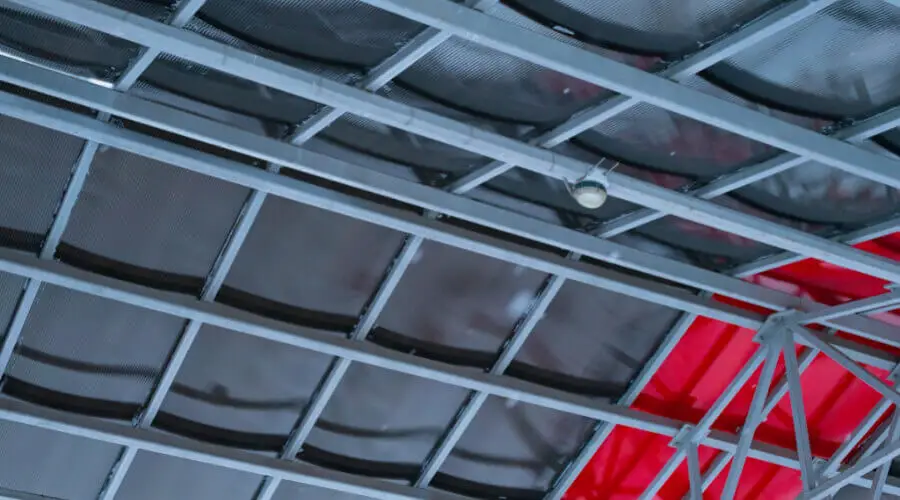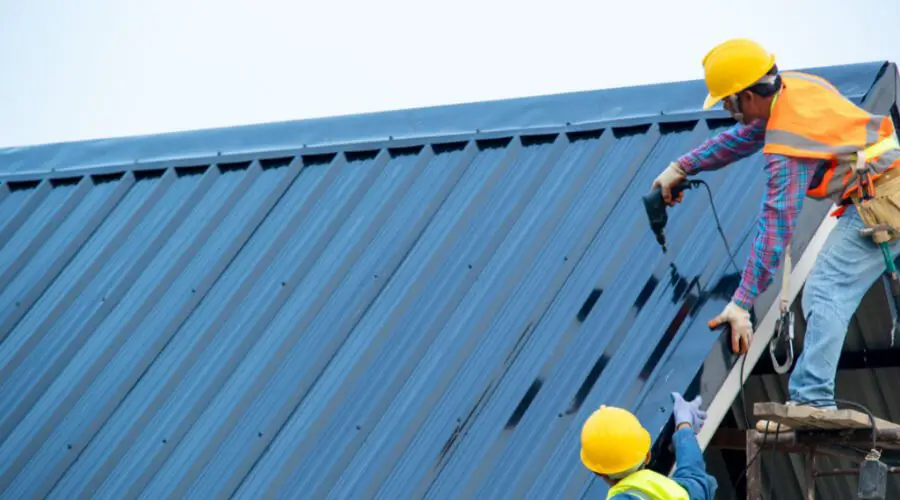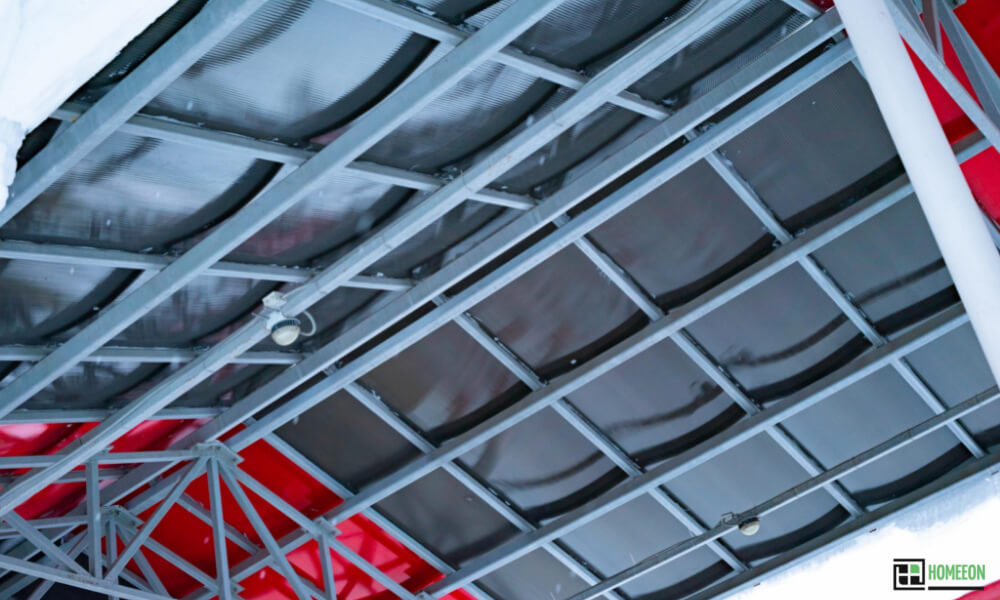Last Updated on July 16, 2023 By Emma W. Thomas
Aluminum roofing has several advantages and disadvantages. The advantages include its lightweight nature, which eases installation and reduces strain on the structure. Aluminum is also resistant to corrosion, making it a durable choice for various climates. It is fire-resistant, environmentally friendly, and reflects heat, leading to energy savings. However, aluminum roofing can be more expensive than other materials, and it may dent more easily. Without proper installation, it can be noisy during rainfall.
Advantages Of Aluminum Roofing

Over the past years, aluminum has become the favorite roofing material due to its benefits. Some of them are:
1. Strong And Durable
Unlike other roofing materials that need replacement after every 15-20 years, aluminum will last you for 50-80 years. During this time, the metal remains wear- and rust-free with its shake panels, tile, and vertical seem to retain its good looks. So, even though its initial cost is high compared to other materials such as Asphalt, it would remain the most cost-effective in the long run. You won’t frequently spend money on repairs, maintenance, and reroofing.
2. Energy Efficient
Aluminum tends to keep your house cold, even in extremely hot temperatures. It deflects 90% of the sunlight that could have otherwise heated your home. This means fewer hours of turning on the air conditioning which saves you a lot of energy.
3. Environmentally Friendly
If you are environmentally conscious, aluminum is the best for roofing as it is 90% recyclable. Besides, it takes about 5% more energy to recycle compared to making primary aluminum. This is low given you can recycle the materials as many times without fear of losing their properties.
4. Easily Installable
Another great advantage of aluminum is its ease of installation. The material is lightweight and flexible, making it easy to handle with less effort or manpower. As a result, you save more time and labor costs during installation or replacement. You can also use the sheets elsewhere after dismantling them as they are strong and rigid; hence they don’t get damaged during removal.
5. Safe As It Can Hold On Against Fires And Stand Severe Weather Conditions
Safety should be one of the top considerations when selecting roofing materials. Aluminum is best because it doesn’t catch fire easily and doesn’t suffer dents from falling objects such as hailstones. Even in harsh weather conditions like a hurricane, aluminum roofing won’t be affected. Besides, they are corrosion-resistant meaning they can withstand outside elements.
6. Prevents Build-up Of Snow On Your Roof
If you live in areas prone to heavy snowfall, aluminum roofing is best for your home. The material lets the snow slip off to the floor to prevent build-up that can damage your property. There will be no snow that would gather or remain on your roof as all will quickly drain before it freezes.
7. Aesthetically Pleasing
If you desire to make your building aesthetically pleasing with a modern look, then aluminum is the best option. The sheets come in various designs and can be coated with other materials for a desirable finish. You will get an aluminum roofing pattern, style, or design suitable for any architectural style or climate. They come in standing seam vertical panels, shakes, slates, shingles, and tiles.
Disadvantages Of Aluminum Roofing

Despite the many advantages that come with aluminum roofing, it has its shortcomings, as discussed below:
1. The Initial Cost Is High
Aluminum sheets are of high quality compared to steel or zinc, hence much more expensive. Installation cost is also high due to its durability compared to asphalt shingles or tiles. Besides, there is a unique way they are set up, making it necessary to hire trained roofers who might charge more.
2. Noisy When It Rains
Like other metal roofs, aluminum roofing is noisy during a heavy downpour. Each drop can be annoying to your ears if you have not installed soundproofing underneath the roof. So, if you want to avoid the not-so-pleasing drumming during rainfall, you should install an extra soundproof sheet underneath. This will also add to the cost of aluminum roofing.
3. The Repair Cost May Be Expensive
Aluminum sheets are arranged such that they overlay each other. If one is damaged, it means removing some parts of the roof to fix it, unlike the asphalt shingles or tiles that can be repaired as one. The fixing of the metal roofing increases the repair cost compared to the shingles types of roof.
4. Expand More Under Heat
Due to the metallic properties of aluminum sheets, they tend to expand more when exposed to heat. For instance, aluminum sheets expand twice when exposed to the same temperatures as steel. As the roof expands, the aluminum sheets risk damage and tearing around nail holes. As a result, the roof could leak when it rains.
However, you can avoid the issue by hiring a professional roofer who will set the foundation right and lay the sheet properly. Therefore, even with the expansion, the aluminum roof would stay intact. But, the whole process makes installation expensive.
5. Dent Easily
Aluminum is malleable, which is a plus when reshaping it as it cannot break or crack easily. This may seem a good feature but might work negatively as the sheets may be affected by elements. For instance, if a tree branch falls on the roof during a heavy storm, it can easily dent. Denting will reduce the efficiency of water flow from the roof and affect its aesthetic appearance.
6. A Roof Can Leak In Case Of Poor Fastener Installation
Fasteners are used to hold the aluminum sheets onto the roof deck or substrate. Unfortunately, if the installation of fasteners is not done well, it can lead to open spots on the roof. This can easily let water into your house, which affects the roofing. It could be the screws are overdriven, under-driven, or off-centered. To avoid such human errors, always hire competent and reputable roofers.
7. There Is The Possibility Of Oil Canning
Oil canning is a situation where the roof surface appears uneven. This is the case with aluminum roof sheets. You may see the roof bulking with invisible waves that change throughout the day. This is a not-so-good sight to look at. Unevenness can be due to hitches in the milling process, improper handling of the sheets during installation, and not leaving enough space between sheets during installation.
You can avoid the issue of oil canning by hiring experienced roofers for installation, applying low-gloss paint to make the surface less reflective, and using thicker roof sheets.
8. Susceptible To Galvanic Corrosion
When different metal types interact under rainwater (electrolyte), galvanic corrosion can easily occur. As a result, roof material will deteriorate faster as the process causes one metal type to corrode more quickly. This compromises the integrity of your roof, hence the need to always hire a professional roofer for installation. An experienced contractor will pick the same material for fasteners and sheets to avoid galvanic corrosion.
Summary Table Of The Advantages And Disadvantages Of Aluminum Roofing
| Advantages of aluminum roofing | disadvantages of aluminum roofing |
| 1. Strong and durable 2. Energy efficient 3. Environmentally friendly 4. Easily installable 5. Safe as it can hold on against fires and stand severe weather conditions 6. Prevents build-up of snow on your roof 7. Aesthetically pleasing | 1. The initial cost is high 2. Noisy when it rains 3. The repair cost may be expensive 4. Expand more under heat 5. Dent easily 6. The roof can leak in case of poor fastener installation 7. There is a possibility of oil canning 8. Susceptible to galvanic corrosion |
Which Is Better, Steel Or Aluminum Roofing?
Both steel and aluminum are great roofing materials for commercial and residential buildings. However, steel is less expensive, more fire-resistant without underlayment, and stronger than aluminum. Here is the comparison table to help you out.

Comparison Between Steel And Aluminum Roofing
| Property | Aluminum | Steel |
| Strength | Strong but not as steel | More strength than aluminum |
| Cost | Expensive | Less expensive compared to aluminum |
| Malleability | More malleable and elastic | Tough but cannot be pushed to the same extent as aluminum |
| Weight | Lighter | Heavier |
| Corrosion resistance | Corrosion-resistant | Susceptible to corrosion unless treated or painted after it is spun |
| Fire resistance | More fire resistance without underlayment | Less fire resistant unless with proper sheathing and underlayment |
What Is Aluminum Roofing?
Aluminum roofing is a type of roofing material that is constructed using aluminum, a lightweight and highly durable metal. It has become increasingly popular in both residential and commercial applications due to its numerous advantages. Aluminum roofing is known for its exceptional strength, making it resistant to various weather conditions including high winds, snow, and hail. It is also resistant to corrosion and rust, making it an excellent choice for areas with high humidity or exposure to saltwater.
Furthermore, aluminum roofing is fire-resistant, making it a safe option for homeowners and businesses. Additionally, this roofing material is highly reflective, which helps to reduce energy costs by keeping the building cooler during the hot summer months. With its versatility, durability, and energy efficiency, aluminum roofing offers an attractive and long-lasting solution for any construction project.
When is the Best to Use Aluminum Roofing?
When considering roofing materials for a construction project, it is important to choose the one that best serves the purpose and meets the specific requirements. Aluminum roofing is a versatile option that offers several advantages, making it a popular choice for various applications. Here are some instances when it is best to use aluminum roofing:
- Coastal areas: Aluminum roofing is highly resistant to the corrosive effects of saltwater and is a great choice for buildings located in coastal areas. The durability of aluminum ensures that it can withstand the harsh weather conditions and saltwater exposure, making it a long-lasting and low-maintenance option.
- Fire-prone regions: Aluminum roofing has excellent fire-resistant properties, making it an ideal choice for areas prone to wildfires. It does not catch fire and can help protect the building from external fires, providing an added layer of safety.
- Low-weight requirement: If the construction project requires a lightweight roofing material, aluminum is a perfect option. It is significantly lighter than many other roofing materials, such as concrete or clay tiles, reducing the overall structural load on the building.
- Energy efficiency: Aluminum roofing has excellent thermal reflectivity, which means it can reflect the sun’s heat, reducing the amount of heat absorbed by the building. This quality makes it energy efficient, helping to lower cooling costs during hot summers.
- Longevity: Aluminum roofing has a long lifespan, often lasting for several decades without significant deterioration. It is highly resistant to rust, corrosion, and weather damage, minimizing the need for frequent repairs or replacements, and ultimately saving costs in the long run.
- Environmentally friendly: Aluminum is a highly recyclable material, and using aluminum roofing contributes to environmental sustainability. Furthermore, installing aluminum roofs can help improve energy efficiency and reduce the carbon footprint of a building.
Final Word
Roofing determines whether your house will be aesthetically pleasing, strong, and safe. Therefore, picking the material for your roof is not a light task. If you go for certain sheets, ensure you understand their pro and cons before installing them on your roof.
For instance, aluminum is one of the materials preferred by many. But that doesn’t mean you blindly go for it. Check its advantages and disadvantages highlighted above to make an informed decision. Of importance is always to hire a skilled and experienced roofer to do the installation for you to minimize the negatives that come with aluminum.
References:
https://www.westernstatesmetalroofing.com/blog/aluminum-roofing-pros-and-cons
https://www.bansalroofing.com/advantages-of-aluminium-roofing-sheets/
Emma is a graduate of Domestic Science or Family and Consumer Sciences (Home Economics) from the University of Wisconsin. She has 7 years of experience Working with the strategic section of BestBuy and now writing full-time for Homeeon.
From Managing the Home, Interiors, Cleaning, and Exteriors to Gardening and everything about Making A Home Liveable – is her passion and this Homeeon is the result of this.
Emma loves decorating her home with the best stuff found online. She cares about quality over anything and writes reviews about them here in Homeeon. Get in touch with her over Pinterest.
Keep reading her blogs.
